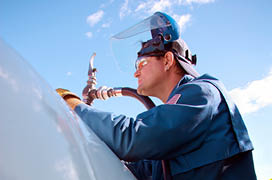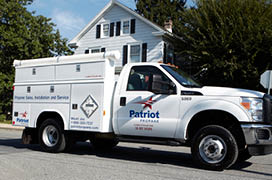If you’re thinking about converting your home’s fuel source from natural gas to propane, it can be a big decision. There are pros and cons to each of these popular fuel sources. Both are efficient, clean-burning sources of consistent heat but cost can vary based on your location and regular shifts in natural resource prices. But when you consider all these factors, propane does prove to be more of a winner.
Propane is more efficient.

- Each unit of propane contains twice as much energy per unit as natural gas, so you only need about half as much propane versus natural gas to achieve the same level of heating.
- When comparing energy costs, it is important to be aware that you will need about half the amount of propane to heat to the same extent as natural gas. Therefore, the cost efficiency is roughly equal when the propane price for the same volume is about double the natural gas price. If the propane price is less than double, propane is more cost effective and if propane costs more than double natural gas, natural gas is more efficient.
- Even when prices fluctuate, propane has one big advantage. With propane, you have a tank and can try to time your purchases to when prices are low and find the best providers to fill it. With natural gas, you’re locked into the pricing of the utility company that owns your gas lines.
Propane tank installation
- It’s critical to install a tank big enough to hold several thousand cubic feet of propane on your property.
- Many people prefer to bury it under their yard to preserve their home’s appearance. This may require digging up your grass but this isn’t permanent and your yard should grow back as normal.
Converting appliances
- Even though propane and natural gas are both fossil fuels that burn similarly, you need to convert your appliances when you make the switch.
- Most, but not all, appliances can be converted from natural gas to propane. The biggest sticking point is that natural gas is kept at a lower pressure, and some appliances can’t handle the higher pressure of propane even with adjustments.
- Because they have different densities and amounts of energy, you must switch out the valves and switches to properly control the flow when switching from one to the other.
- It is important to consult a professional when considering making the switch from natural gas to propane as the work involved is highly technical and can be dangerous if the person doing the work does not have the required experience.
Get a conversion kit

- Ideally, when you buy a new appliance, you should make sure it comes with a conversion kit in case you do decide to convert between natural gas and propane in the future.
- For older appliances where you don’t have a kit, you can buy one separately. Be sure to read the instructions for both the kit and your appliance to ensure you can safely use the kit.
Converting a natural gas stove
- Most stoves come set up ready for natural gas because it is the most commonly used fuel for indoor cooking. But if your stove is powered by electricity, you’ll need to convert to a natural gas powered stove before having it fueled by propane.
- The biggest switch needed for a stovetop is switching to burners with smaller orifices so that less propane comes out.
- Remember that propane has more heat energy, so you need less to cook your food. Because of the dangers of gas leaks, we recommend leaving this part of the job to professionals.
Test and adjust appliance settings
- Even after you’ve replaced the valves and orifices on your appliances, you’ll probably still need to adjust their settings after switching. This is to make sure that you have the proper food and water temperatures required for everyday living.
Have any more questions about converting from natural gas to propane? We can help explain the advantages of switching to propane plus more about what it takes to make the switch. Give us a call today.
